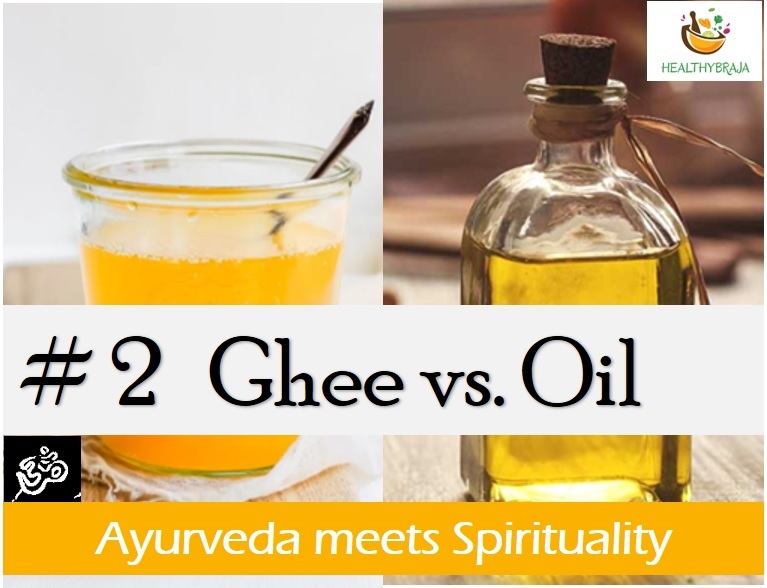
Ayurveda meets Spirituality – #2 Ghee vs. Oil
Today, I would like to share an interesting story from the epic Ramayan. Hanuman, a great devotee of Lord Sri Rama, was known for his special & rare combination of qualities of strength, devotion and intelligence. Once he inquisitively asked mother Sita about the significance of the sindoor (the orange/red mark ornamentally put on forehead of a married woman in Indian tradition) on her forehead. Mother Sita explained that she does this to please Lord Rama and to increase his longevity. Inspired hearing mother Sita, he straight went to the storage room to find sindoor to apply on his entire body. He was thinking, if little sindoor on mother Sita’s forehead can be so beneficial for Lord Rama, why don’t I apply it all over my body and please him. Since the sindoor wasn’t sticking on his body directly, he mixed it with ghee from the pot nearby and covered himself fully with sindoor. This happened to be a Tuesday. When Lord Rama saw this, he blessed everyone that anyone who offers sindoor to Hanumanji on Tuesday will get their prayers answered!
What caught attention to my ayurvedized brain in this story is Hanuman used GHEE to smear the sindoor over his body! In India, you may have seen a large number of people seek Hanumanji’s blessings by offering sindoor with oil on Tuesdays. I was wondering how and when did ghee get replaced with oil?! Perhaps, it’s just like how ghee got replaced for cooking in many households?
Well, many of us would know and might have experienced that our grandparents and generation prior to theirs had much higher longevity and better health as compared to the recent generations. They would eat a lot of ghee as part of their diet. Practically every dish was cooked in ghee, every desert was loaded with ghee. Did you know, they would feed a new mom in postpartum phase up to 40 kg of ghee in different forms in their diet?! And these women would bounce back to health physically much stronger, with great health, higher longevity. Moreover, cholesterol or heart issues were rarely the talk of their times.
For our generation, how did ghee possibly become the cause of diseases and different oils gained entry into our kitchens? Approximately 60 years ago, when a wave of industrialization began in India, they started producing ghee commercially. In order to make production of ghee quick & profitable, most production units started skipping the step of culturing the yoghurt to make ghee. They made ghee directly out of milk/milk fat. This completely changed the quality and effectiveness of ghee. Culturing the yoghurt and infusing friendly bacteria in the process of making ghee has multiple benefits including making it much lighter to digest. It is at this time when most people started using commercially produced ghee and started reporting health challenges like high cholesterol, heart attacks, diabetes and more. Doctors connected these issues with use of ghee and thus a variety of oils became our new family members. These refined vegetable oils were advertised for their high content of polyunsaturated fatty acids which were supposed to provide multiple health benefits. We have used them for years. Many studies have now started showing that these oils contain long chain fatty acids which are very sensitive to heat and are unstable. They get oxidized upon heating, form free radicals and create a toxic built up in the body which is a seed to various chronic diseases like disruption of thyroid function, imbalances of hormones, sluggish metabolism, autoimmune, low energy to name a few.
Scientists are also discovering the great benefits of Ayurvedic cultured ghee. Ghee is not the problem but using wrong ghee is the problem! The unique qualities of cultured ghee actually make it an indispensable food item for individuals seeking good health. That’s where Ghee is actually also known as “Food of Gods”. To learn more about benefits of ghee and how to make your own right, cultured probiotic ghee at home check my blog https://www.healthybraja.com/…/make-your-own-liquid…/.


